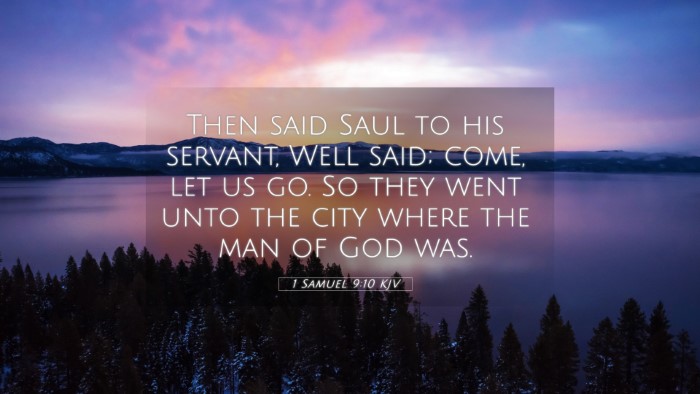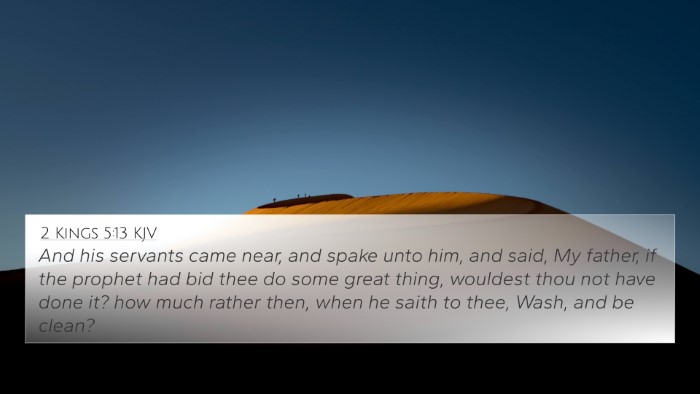1 Samuel 9:10 Meaning and Interpretation
1 Samuel 9:10 states: "Then said Saul to his servant, Well said: come, let us go. So they went unto the city where the man of God was." This verse presents an important moment in the narrative of Saul's anointing as king over Israel and highlights the relationship between divine guidance and human action.
Public domain commentaries provide various insights into this verse, emphasizing several key themes:
-
Divine Providence: Matthew Henry notes that God is actively guiding the decisions of Saul and his servant. Their journey to find the lost donkeys leads them to the prophet Samuel, illustrating how God orchestrates events for His purposes.
-
The Role of the Servant: According to Adam Clarke, the servant plays a significant role in this event, suggesting that he represents guidance and wisdom. His input encourages Saul to seek the prophet, emphasizing the importance of wise counsel in decision-making.
-
Faith and Obedience: Albert Barnes points out that Saul demonstrates faith and obedience by agreeing to the servant's suggestion. This response signifies a readiness to pursue divine direction, an essential quality for future leaders.
-
Importance of Seeking Guidance: The act of seeking out "the man of God" highlights the biblical principle of consulting those endowed with spiritual wisdom, a theme echoed throughout Scripture.
This verse connects to broader biblical themes and cross-references that illuminate its significance:
-
1 Samuel 3:20 - This verse also emphasizes the recognition of Samuel as a prophet in Israel, showing the importance of divine messengers in guiding the nation.
-
Proverbs 15:22 - "Without counsel plans fail, but with many advisers they succeed," parallels the determination to seek wisdom in leadership decisions.
-
Jeremiah 29:13 - "You will seek me and find me, when you seek me with all your heart," underscores the necessity of earnest pursuit of God's guidance.
-
Acts 8:30-31 - Philip encounters an Ethiopian eunuch who seeks understanding; it parallels the act of seeking divine understanding and revelation.
-
Luke 11:9 - "Ask, and it will be given to you; seek, and you will find," reflects the assurance in seeking guidance from God.
-
Proverbs 3:5-6 - "Trust in the Lord with all your heart, and do not lean on your own understanding," correlates with the faith demonstrated by Saul.
-
James 1:5 - "If any of you lacks wisdom, let him ask of God," emphasizes the need for divine wisdom, which Saul seeks through Samuel.
-
1 Chronicles 10:14 - This verse emphasizes who Saul was and how God had rejected him, providing a backdrop to understand the choices made in this narrative.
Through a comparative Bible verse analysis, we can explore the thematic connections and cross-references that clarify the essence of seeking divine guidance in Scripture. The interactions between the Old and New Testament reveal that the physical journey to a prophet mirrors the spiritual quest to understand God's will in our lives.
Tools for Bible Cross-Referencing are essential for in-depth studies of passages like 1 Samuel 9:10. Utilizing a Bible concordance or a Bible cross-reference guide allows for efficient cross-reference Bible study, making it easier to identify connections between biblical texts.
Understanding the connections in the Bible enriches our study; cross-referencing Bible study methods can illuminate patterns that illustrate God's ongoing dialogue with humanity. As one uses Bible reference resources, themes tying the Old and New Testaments surface, enhancing comprehension and application in personal and communal contexts.
Inter-Biblical dialogue reveals the continuity of God’s revelation through His chosen individuals and emphasizes that the faithful pursuit of knowledge from Scripture is foundational to spiritual growth. Comprehensive Bible cross-reference materials further support the understanding of how various verses speak to one another, ultimately leading to a deeper appreciation of the unity of biblical revelation.



